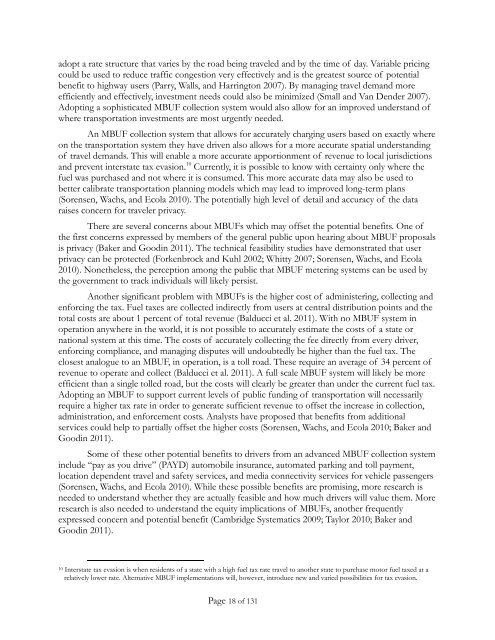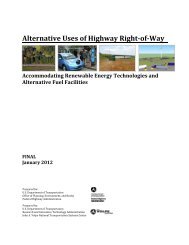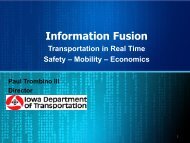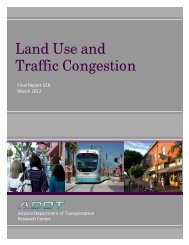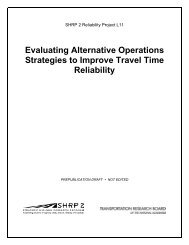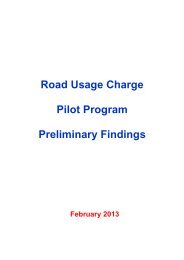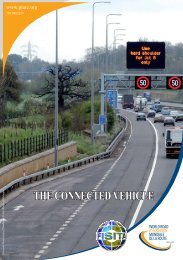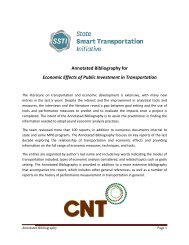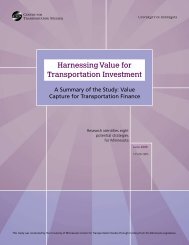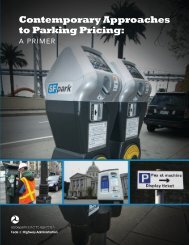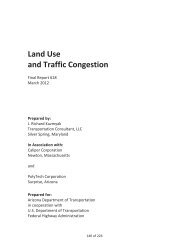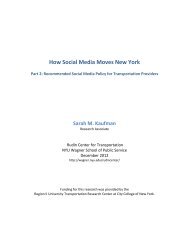Mileage-Based User Fee Winners and Losers - RAND Corporation
Mileage-Based User Fee Winners and Losers - RAND Corporation
Mileage-Based User Fee Winners and Losers - RAND Corporation
You also want an ePaper? Increase the reach of your titles
YUMPU automatically turns print PDFs into web optimized ePapers that Google loves.
adopt a rate structure that varies by the road being traveled <strong>and</strong> by the time of day. Variable pricing<br />
could be used to reduce traffic congestion very effectively <strong>and</strong> is the greatest source of potential<br />
benefit to highway users (Parry, Walls, <strong>and</strong> Harrington 2007). By managing travel dem<strong>and</strong> more<br />
efficiently <strong>and</strong> effectively, investment needs could also be minimized (Small <strong>and</strong> Van Dender 2007).<br />
Adopting a sophisticated MBUF collection system would also allow for an improved underst<strong>and</strong> of<br />
where transportation investments are most urgently needed.<br />
An MBUF collection system that allows for accurately charging users based on exactly where<br />
on the transportation system they have driven also allows for a more accurate spatial underst<strong>and</strong>ing<br />
of travel dem<strong>and</strong>s. This will enable a more accurate apportionment of revenue to local jurisdictions<br />
<strong>and</strong> prevent interstate tax evasion. 10 Currently, it is possible to know with certainty only where the<br />
fuel was purchased <strong>and</strong> not where it is consumed. This more accurate data may also be used to<br />
better calibrate transportation planning models which may lead to improved long-term plans<br />
(Sorensen, Wachs, <strong>and</strong> Ecola 2010). The potentially high level of detail <strong>and</strong> accuracy of the data<br />
raises concern for traveler privacy.<br />
There are several concerns about MBUFs which may offset the potential benefits. One of<br />
the first concerns expressed by members of the general public upon hearing about MBUF proposals<br />
is privacy (Baker <strong>and</strong> Goodin 2011). The technical feasibility studies have demonstrated that user<br />
privacy can be protected (Forkenbrock <strong>and</strong> Kuhl 2002; Whitty 2007; Sorensen, Wachs, <strong>and</strong> Ecola<br />
2010). Nonetheless, the perception among the public that MBUF metering systems can be used by<br />
the government to track individuals will likely persist.<br />
Another significant problem with MBUFs is the higher cost of administering, collecting <strong>and</strong><br />
enforcing the tax. Fuel taxes are collected indirectly from users at central distribution points <strong>and</strong> the<br />
total costs are about 1 percent of total revenue (Balducci et al. 2011). With no MBUF system in<br />
operation anywhere in the world, it is not possible to accurately estimate the costs of a state or<br />
national system at this time. The costs of accurately collecting the fee directly from every driver,<br />
enforcing compliance, <strong>and</strong> managing disputes will undoubtedly be higher than the fuel tax. The<br />
closest analogue to an MBUF, in operation, is a toll road. These require an average of 34 percent of<br />
revenue to operate <strong>and</strong> collect (Balducci et al. 2011). A full scale MBUF system will likely be more<br />
efficient than a single tolled road, but the costs will clearly be greater than under the current fuel tax.<br />
Adopting an MBUF to support current levels of public funding of transportation will necessarily<br />
require a higher tax rate in order to generate sufficient revenue to offset the increase in collection,<br />
administration, <strong>and</strong> enforcement costs. Analysts have proposed that benefits from additional<br />
services could help to partially offset the higher costs (Sorensen, Wachs, <strong>and</strong> Ecola 2010; Baker <strong>and</strong><br />
Goodin 2011).<br />
Some of these other potential benefits to drivers from an advanced MBUF collection system<br />
include “pay as you drive” (PAYD) automobile insurance, automated parking <strong>and</strong> toll payment,<br />
location dependent travel <strong>and</strong> safety services, <strong>and</strong> media connectivity services for vehicle passengers<br />
(Sorensen, Wachs, <strong>and</strong> Ecola 2010). While these possible benefits are promising, more research is<br />
needed to underst<strong>and</strong> whether they are actually feasible <strong>and</strong> how much drivers will value them. More<br />
research is also needed to underst<strong>and</strong> the equity implications of MBUFs, another frequently<br />
expressed concern <strong>and</strong> potential benefit (Cambridge Systematics 2009; Taylor 2010; Baker <strong>and</strong><br />
Goodin 2011).<br />
10 Interstate tax evasion is when residents of a state with a high fuel tax rate travel to another state to purchase motor fuel taxed at a<br />
relatively lower rate. Alternative MBUF implementations will, however, introduce new <strong>and</strong> varied possibilities for tax evasion.<br />
Page 18 of 131


